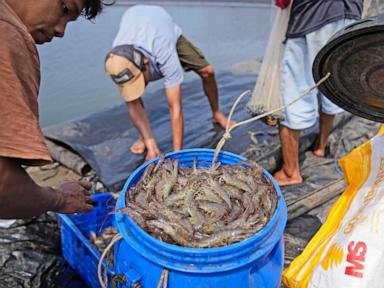Takeaways from AP’s anecdote on how shrimp farmers are exploited as supermarkets push for low costs
Private investigator near me:
BANGKOK — A brand recent investigation focused on three of the sector’s greatest producers of shrimp released on Monday claims that as mammoth Western supermarkets develop windfall income, their aggressive pursuit of ever-lower wholesale costs is causing effort for folk at the backside stop of the provide chain.
The regional prognosis of the industry in Vietnam, Indonesia and India, which provide about half the shrimp on the planet’s top four markets — the usa, European Union, United Kingdom and Japan — is in step with investigate completed by an alliance of NGOs. It chanced on a 20%-60% drop in earnings from pre-pandemic levels as producers fight to fulfill pricing requires by cutting labor charges.
In many locations this has intended unpaid and underpaid work through longer hours, wage insecurity as charges fluctuate, and loads workers no longer even making low minimum wages.
Supermarkets linked to facilities where exploited labor was reported by workers encompass Map, Walmart and Costco within the usa, Britain’s Sainsbury’s and Tesco, and Aldi and Co-op in Europe.
The regional anecdote brought collectively more than 500 interviews conducted in-particular person with workers of their native languages, in India, Indonesia and Vietnam — printed one at a time as country-particular stories — supplemented with secondary data and interviews from Thailand, Bangladesh and Ecuador.
In Vietnam, Hawaii-based Sustainability Incubator investigators chanced on that the staff who peel, gut and devein shrimp in most cases work six or seven days a week, in most cases in rooms saved extremely frigid to retain the product recent.
Some 80% of those intriguing about processing shrimp are ladies, many of whom rise at 4 a.m. and return house at 6 p.m. Pregnant ladies and recent moms can stop one hour earlier, the anecdote chanced on.
In India, researchers from the Company Accountability Lab chanced on that workers face “unhealthy and abusive stipulations.” Highly salinated water from newly dug hatcheries and ponds, heinous with chemical substances and toxic algae, additionally contaminate surrounding water and soil.
Unpaid labor prevails, including salaries below minimum wage, unpaid additional time, wage deductions for charges of work and “vital” debt bondage, the anecdote chanced on. Child labor was additionally chanced on, with ladies veteran 14 and 15 being recruited for peeling work.
In Indonesia, three non-profit compare organizations chanced on that wages personal fallen since the COVID-19 pandemic and at the unusual time moderate $160 monthly for shrimp workers, below Indonesia’s minimum wage in heaps of the very most attention-grabbing shrimp-producing provinces. Puny peelers automatically are required to work at the very least 12 hours per day to fulfill minimum targets.
Switzerland’s Co-op acknowledged it had a “zero tolerance” policy for labor legislation violations and that its producers “receive gorgeous and market-driven costs.”
Germany’s Aldi failed to particularly address the discipline of pricing, but acknowledged it uses fair certification schemes to be definite responsibly sourcing for farmed shrimp merchandise, and would proceed to visual show unit the allegations.
“We’re committed to fulfilling our responsibility to appreciate human rights,” Aldi acknowledged.
Sainsbury’s referred to a comment from the British Retail Consortium industry neighborhood, which acknowledged its contributors had been committed to sourcing merchandise at a “gorgeous, sustainable mark” and that the welfare of of us and communities in provide chains is key to their procuring practices.
The Vietnam Association of Seafood Exporters and Producers issued a command calling the allegations within the anecdote “fraudulent, misleading and detrimental to the reputation of Vietnam’s shrimp exports,” citing government labor insurance policies.
The NGO’s anecdote stresses that the utilize of middlemen to catch the shrimp obfuscates the factual sources of shrimp that appear in western supermarkets, so many retailers may per chance maybe presumably per chance no longer be following ethical commitments they’ve made about procuring shrimp.
Entirely about 2,000 of the 2 million shrimp farms within the foremost producing international locations are certified by either the Aquaculture Stewardship Council or the Most productive Aquaculture Practices ecolabel, making it “mathematically most unlikely for certified farms to make ample shrimp monthly to give all of the supermarkets that boast commitments to procuring certified shrimp,” the anecdote says.
U.S. policymakers may per chance maybe presumably per chance utilize antitrust and various legal pointers already in contrivance to connect oversight to be definite gorgeous pricing from western retailers, in decision to imposing punishing tariffs on suppliers, says Katrina Nakamura of Sustainability Incubator, who wrote the regional anecdote.
In July, the European Union adopted a brand recent directive requiring corporations to “title and address opposed human rights and environmental impacts of their actions interior and open air Europe.”
Officials from Indonesia and Vietnam personal met with the anecdote’s authors to debate their findings and take into myth for solutions.
Given primarily the most unusual disparity in retail and wholesale costs, paying more to farmers mustn’t need to mean increased costs for patrons, the Sustainability Incubator anecdote acknowledged, nonetheless it would mean lower income for the supermarkets.
“Labor exploitation in shrimp aquaculture industries is no longer company, sector, or country-particular,” the anecdote concludes. “As a replacement, it’s the of a hidden enterprise model that exploits of us for profit.”
___
This model has corrected the spelling of a researcher’s title to Katrina no longer Katrin.
___
This legend was supported by funding from the Walton Family Foundation. The AP is entirely guilty for all pronounce.





